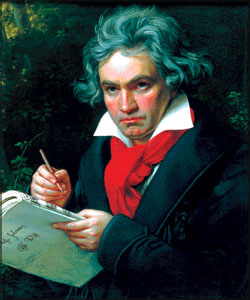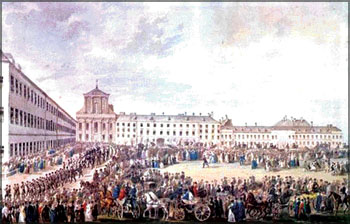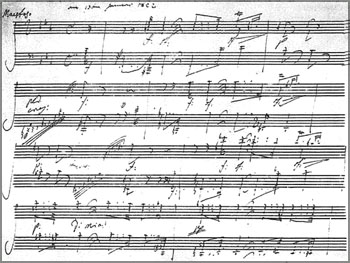|
Beethoven
A great composer
 Those
of you who are interested in music may have heard of the great German
composer Ludwig van Beethoven. Those
of you who are interested in music may have heard of the great German
composer Ludwig van Beethoven. He is one of the most famous composers in the history of music, and is
occasionally referred to as one of the "three Bs" (along with Bach and
Brahms).
He is one of the most famous composers in the history of music, and is
occasionally referred to as one of the "three Bs" (along with Bach and
Brahms).
He was an important figure in the period when Western classical music
underwent a transition, from Classical in the 18th Century to Romantic
in the 19th Century.
Beethoven and his music inspired many generations of composers,
musicians, and audiences. Although he was better known as a composer, he
was an excellent pianist as well.
Although Beethoven's exact date of birth is not known, he was
baptised on December 17, 1770 (most believe his birthday to be December
16). He was born in Bonn, to Johann van Beethoven, a musician of Flemish
ancestry, and Maria Magdalena Keverich. He was one of seven children, of
whom only he and two younger brothers survived past infancy.
Young Beethoven first learnt music under his father, a tenor in the
service of the Electoral Court at Bonn. His father later engaged a
friend, Tobias Pfeiffer, to continue the boy's training, and it is said
that Johann and his friend would come home late at times and pull the
young boy out of bed to practise until morning.
Beethoven's teachers recognised his talent rather early and by 1778,
he was studying the organ, violin, viola and piano. Christian Gottlob
Neefe was his most important teacher at the time.
Beethoven travelled to Vienna in 1787, where he played for Wolfgang
Amadeus Mozart (whom the Junior Observer has already featured). His
mother died of tuberculosis in 1787, when Beethoven was 16, and due to
this and his
|

Beethoven’s funeral |
father's alcohol addiction, the boy had to take the responsibility of
raising his two younger brothers.
Beethoven moved to Vienna in 1792, where he started studying with
Joseph Haydn, and started acquiring a reputation as an excellent
pianist. Johann Georg Albrechtsberger (renowned Viennese instructor) and
Antonio Salieri were some of his other instructors.
By 1793, Beethoven had established a reputation in Vienna as a master
pianist. Beethoven was also one of the first composers to work freelance
- arranging concerts, selling his compositions to publishers, and
gaining financial support from wealthy patrons (one who sponsors or aids
artists) - instead of being permanently employed in a church or royal
court.
A tragic development that happened in his late twenties, around 1796,
was that he started losing his hearing. This was caused by a severe form
of tinnitus, a "ringing" in his ears, and made it hard for him to
understand and appreciate music. Despite this, he continued to come out
with masterpieces, even after he had become almost totally deaf.
A well-known story says that, at the end of the premiere of his Ninth
Symphony, he had to be turned around to see the overwhelming applause of
the audience, and that hearing nothing, he started weeping. However, his
hearing impairment(weakness or damage) resulted in him keeping
conversation books discussing music and other issues, and giving an
insight into his thoughts, which have today been preserved as unique
historical records.
Despite attaining greatness in music, Beethoven had a troubled
personal life. He never married and often quarrelled with his relatives
as well as other people; he is said to have treated others rather badly.
Despite all this, he had a close and devoted circle of friends
throughout his life, and they are said to have helped
|

A manuscript of Beethoven |
him cope with illness and his deafness, later in life.
It is also said that he would stop a performance halfway if the
audience chattered among themselves without paying their full attention
to him, and also that he wouldn't perform at gatherings if his hosts
suddenly called upon him to do so without any advance warning.
His work was wide and varied; he composed outstanding pieces for
symphonies, concerti, piano sonatas, other sonatas (including for
violin), string quartets and other chamber music, masses, an opera,
lieder, and many other types of music. This outstanding musician and
composer died on March 26, 1827 at the age of 57.
***
Beethoven's work
Beethoven's career composing music could be divided into Early,
Middle, and Late periods.
In the Early period, he followed great composers before him like
Haydn and Mozart, while at the same time exploring new directions and
gradually expanding the scope and ambition of his work.
Some outstanding pieces from this era are the first and second
symphonies, the first six string quartets, the first three piano
concertos, and the first twenty piano sonatas, including the famous 'Pathetique'
and 'Moonlight' sonatas.
The Middle period is centred around his personal problems,
highlighted by approaching deafness.
This period is noted for large-scale works expressing heroism and
struggle, and include many of his most famous works such as six
symphonies (Nos. 3-8), the fourth and fifth piano concertos, the triple
concerto, violin concerto, five string quartets (Nos. 7-11), the next
seven piano sonatas (including the 'Waldstein' and 'Appassionata'), and
his only opera, Fidelio.
The Late period began around 1816 and its works are characterised by
intellectual depth, intense and highly personal expressions and formal
innovation. The String Quartet, Op. 131, the Ninth Symphony, 'Missa
Solemnis', the last five string quartets and the last five piano sonatas
are some of the examples from this era. |
